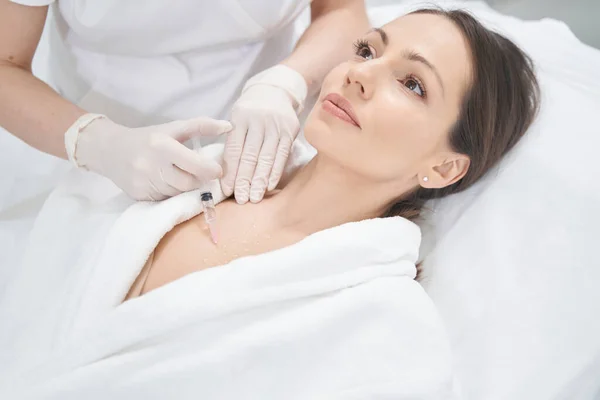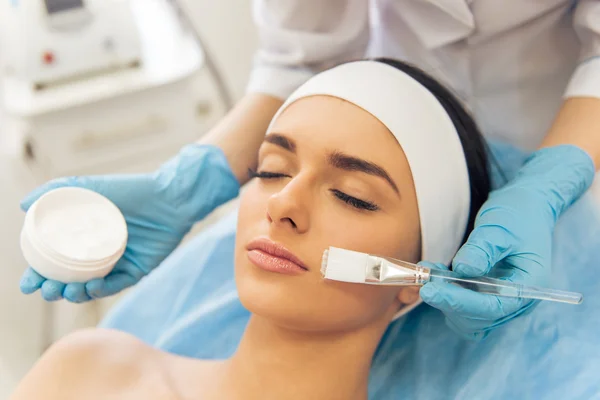Expert Tips On Choosing The Right Aesthetic Treatment For Your Skin
Choosing the right aesthetic treatment for your skin can be a daunting task given the myriad of options available. From laser therapies to chemical peels, the choices can be overwhelming. This guide aims to simplify the process by offering expert tips on selecting the best treatment for your unique skin type and concerns.
Identifying Your Skin Type
Before selecting any aesthetic treatment, it's crucial to understand your skin type. Skin types are generally classified into five categories:
- Normal Skin: Balanced, neither too oily nor too dry.
- Dry Skin: Lacks moisture, prone to flaking and fine lines.
- Oily Skin: Excess sebum production, prone to acne and enlarged pores.
- Combination Skin: Oily in the T-zone (forehead, nose, chin) and dry or normal elsewhere.
- Sensitive Skin: Easily irritated, prone to redness and allergic reactions.
Determining your skin type can be done through self-assessment or by consulting with a dermatologist. Knowing your skin type is the first step in choosing the right treatment.
Common Skin Concerns and Treatment Options
Skin concerns vary widely among individuals, and each concern requires specific treatments to address effectively. Below are some of the most common skin issues and the various options available for treating them.
Acne and Acne Scars
Acne is a prevalent skin condition affecting people of all ages, characterized by pimples, blackheads, and cysts. It often leads to scarring, which can be a significant cosmetic concern. Treatments for acne and its scars include:
Chemical peels use various acids to exfoliate the skin and remove dead skin cells, which helps to reduce acne and lighten acne scars. These peels can range from mild to deep, depending on the severity of the condition and the desired results. Laser therapy targets deeper layers of the skin, promoting collagen production and healing. This can significantly reduce acne scars and improve overall skin texture. Microneedling involves creating tiny punctures in the skin using fine needles. This process stimulates the body's natural healing response, leading to increased collagen production and reduced acne scars over time.

Hyperpigmentation
Hyperpigmentation refers to dark spots or patches on the skin caused by excess melanin production. This condition can result from sun exposure, hormonal changes, or skin injuries. Several treatments can effectively address hyperpigmentation:
Laser treatments, such as Q-switched lasers, can break down melanin deposits in the skin, thereby reducing the appearance of dark spots. These treatments are often effective for more severe or stubborn hyperpigmentation. Topical treatments include products with ingredients like hydroquinone, retinoids, and vitamin C, which can lighten dark spots and even out skin tone. Consistent use of these products is essential for achieving noticeable results. Chemical peels can also help reduce hyperpigmentation by removing the top layer of skin, which often contains the most significant concentration of melanin. Different strengths of peels can be used depending on the severity of the pigmentation.
Fine Lines and Wrinkles
Aging skin often develops fine lines and wrinkles due to a decrease in collagen and elastin production. Several treatments are available to address these signs of aging:
Botox and fillers are popular options for temporarily reducing the appearance of fine lines and wrinkles. Botox works by relaxing facial muscles, preventing them from creating wrinkles. Fillers, on the other hand, add volume to areas that have lost fullness, smoothing out wrinkles and giving the skin a more youthful appearance. Laser resurfacing stimulates collagen production by targeting the deeper layers of the skin. This treatment helps to smooth out wrinkles and improve overall skin texture. Microdermabrasion is a less invasive option that exfoliates the skin, removing dead skin cells and promoting new cell growth. This treatment can improve skin texture and reduce the appearance of fine lines over time.
Rosacea
Rosacea is a chronic skin condition characterized by redness, visible blood vessels, and sometimes acne-like bumps. Managing rosacea requires gentle and specific treatments:
Topical treatments for rosacea often include antibiotics or anti-inflammatory medications that help reduce redness and inflammation. These treatments can be prescribed by a dermatologist and are usually part of a daily skincare routine. Laser therapy can also be effective for treating the visible blood vessels associated with rosacea. Pulsed dye lasers and intense pulsed light (IPL) treatments target the blood vessels, reducing their appearance and overall redness. It is essential to use gentle skincare products designed for sensitive skin when managing rosacea. Harsh products can exacerbate symptoms, so opt for mild, non-irritating cleansers and moisturizers.

Melasma
Melasma is a form of hyperpigmentation that appears as brown or grayish patches on the skin, often on the face. Hormonal changes, sun exposure, and genetic factors can contribute to its development. Treatment options for melasma include:
Topical treatments with ingredients such as hydroquinone, tretinoin, and corticosteroids can lighten melasma patches. These treatments often need to be used in combination for the best results. Chemical peels can also help reduce the appearance of melasma by exfoliating the top layer of the skin and promoting new skin growth. Laser and light therapies can be effective, but they must be used with caution, as they can sometimes worsen melasma if not properly administered. It is crucial to protect the skin from sun exposure by using broad-spectrum sunscreen daily, as UV rays can exacerbate melasma.
Importance of Aftercare
Post-treatment care is vital to achieving and maintaining results. Proper aftercare minimizes the risk of complications and helps the skin heal more effectively. This may include using specific skincare products, avoiding sun exposure, and following a healthy skincare routine.
Backfocus 7/520 Collins St, Melbourne VIC 3000, Australia
Phone: 1800 248 975

